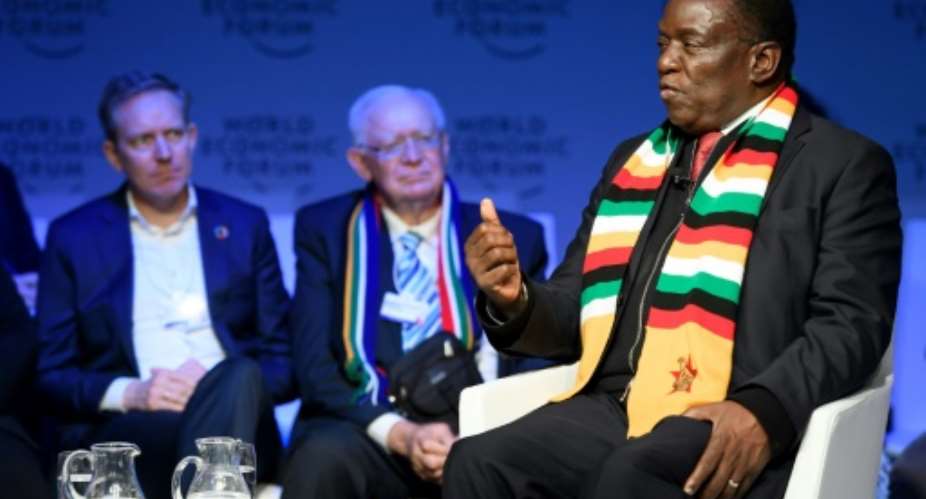Zimbabwe will go to the polls before July, in the first elections since Robert Mugabe was ousted after 37 years in power, the country's new President Emmerson Mnangagwa said Wednesday.
Mnangagwa, who took office in November after a shock military takeover led to Mugabe's resignation, promised to hold a fair vote and to accept the result if he loses.
Under Mugabe, who had ruled since 1980, Zimbabwean elections were marred by vote-rigging, intimidation and violent suppression of the opposition.
"Next month I will be able to make a proclamation of elections, so I believe that elections will not be in July, they will be earlier than July," Mnangagwa said at the World Economic Forum in Davos, Switzerland.
"We want to have free, fair, credible elections, free of violence," he said, adding that he would welcome international observers.
"If you have that criteria, why would you want to deny international observers coming into our country? The European Union... I would welcome them," he said.
"If we lose elections, that's it. Whichever party wins the election will proceed to take the reins of power."
The elections, which were previously expected in late July or August, will choose the country's president and both houses of parliament.
Former Mugabe ally
Mnangagwa, 75, was one of Mugabe's closest long-term allies in the ruling ZANU-PF party, and he is accused of playing a key role in Mugabe's authoritarian regime that left the economy in ruins.
Mugabe, 93, was finally forced to quit when the military took power and once-loyal ZANU-PF lawmakers launched impeachment proceedings against him.
His final years in office were marked by a succession battle between Mnangagwa, who was covertly backed by the military, and supporters of Mugabe's wife Grace.
Mnangagwa has appointed military officials to key government positions and pledged to revive the economy by boosting agricultural production and attracting foreign investment.
"Zimbabwe has lagged behind in many areas as a result of isolation... now we are saying to the world 'Zimbabwe is now open for business'," he said in Davos.
"We would want to embrace the international community. We also want the international community to embrace us."
The main opposition Movement for Democratic Change (MDC) party has been weakened by splits, and its leader Morgan Tsvangirai is in poor health as he battles cancer.
Election goodwill?
The London-based Africa Research Institute said in a briefing paper on Wednesday that after Mugabe's fall, Mnangagwa might be able to "count on a great deal of goodwill among Zimbabweans hopeful for a new future".
"Turnout is likely to determine whether Mnangagwa can win an absolute majority in the (election) first round and thus avoid a run-off," it said.
Mnangagwa has been keen to avoid any public sign of friction within Zimbabwe's ruling elite, and he repeated on Wednesday that Mugabe had received a "lucrative" retirement package.
Under Mugabe, the economy collapsed after land reforms in 2000 that saw white-owned farms seized.
As agricultural production crashed, investors fled and hyperinflation forced Zimbabwe to abandon its currency. The country has since suffered mass unemployment and emigration.





 This IMANI job no dey pap; the people you are fighting for are always fighting y...
This IMANI job no dey pap; the people you are fighting for are always fighting y...
 Prof. Naana Opoku-Agyemang has changed; you can see a certain sense of urgency –...
Prof. Naana Opoku-Agyemang has changed; you can see a certain sense of urgency –...
 MFWA Executive Director slams Akoma FM for engaging in ‘irresponsible’ media pra...
MFWA Executive Director slams Akoma FM for engaging in ‘irresponsible’ media pra...
 ‘Women must become millionaires too’ — Prof Jane Naana on establishment of Women...
‘Women must become millionaires too’ — Prof Jane Naana on establishment of Women...
 Some believe only in Ghanaian votes, not Ghana — Kofi Asare jabs politicians
Some believe only in Ghanaian votes, not Ghana — Kofi Asare jabs politicians
 Plan to make BEST sole aggregator of Sentuo Oil Refinery will create market chal...
Plan to make BEST sole aggregator of Sentuo Oil Refinery will create market chal...
 2024 elections: I can't have the man I removed from office as my successor — Aku...
2024 elections: I can't have the man I removed from office as my successor — Aku...
 2024 Elections: Immediate-past NPP Germany Branch Chairman garners massive votes...
2024 Elections: Immediate-past NPP Germany Branch Chairman garners massive votes...
 Gov’t focused on making Ghana energy self-sufficient, eco-friendly – Akufo-Addo
Gov’t focused on making Ghana energy self-sufficient, eco-friendly – Akufo-Addo
 April 25: Cedi sells at GHS13.74 to $1, GHS13.14 on BoG interbank
April 25: Cedi sells at GHS13.74 to $1, GHS13.14 on BoG interbank
